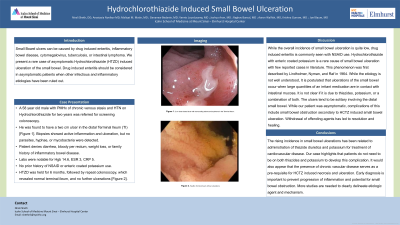Monday Poster Session
Category: Small Intestine
P2649 - Hydrochlorothiazide Induced Small Bowel Ulceration
Monday, October 23, 2023
10:30 AM - 4:15 PM PT
Location: Exhibit Hall

Has Audio

Nirali Sheth, DO
Icahn School of Medicine Mount Sinai - Elmhurst Hospital Center
Rego Park, New York
Presenting Author(s)
Nirali Sheth, DO1, Anastasia Novikov, MD2, Maliyat M. Matin, MD3, Vennis Lourdusamy, MD4, Genanew Bedanie, MD5, Aaron Walfish, MD4, Joshua Aron, MD6, Krishna Gurram, MD6, Raghav Bansal, MD7, Joel Baum, MD8
1Icahn School of Medicine Mount Sinai - Elmhurst Hospital Center, Rego Park, NY; 2Elmhurst Hospital Center/ Icahn School of Medicine at Mount Sinai, Elmhurst, NY; 3Icahn School of Medicine Mount Sinai - Elmhurst Hospital Center, Elmhurst, NY; 4Elmhurst Hospital Center/ Icahn School of Medicine, Elmhurst, NY; 5Icahn School of Medicine at Mount Sinai, New York, NY; 6Icahn School of Medicine at Mount Sinai, NYC Health + Hospitals/Elmhurst, Queens, NY; 7Elmhurst Hospital Center, Elmhurst, NY; 8Icahn School of Medicine at Mount Sinai - Elmhurst Hospital, Queens, NY
Introduction: Small Bowel ulcers can be caused by drug induced enteritis, inflammatory bowel disease, cytomegalovirus, tuberculosis, or intestinal lymphoma. We present a rare case of asymptomatic Hydrochlorothiazide (HTZD) induced ulceration of the small bowel. Drug induced enteritis should be considered in asymptomatic patients when other infectious and inflammatory etiologies have been ruled out.
Case Description/Methods: A 58 year old male with history of chronic venous stasis and Hypertension on HTZD was referred for a screening colonoscopy. He was found to have a two cm ulcer in the distal Terminal Ileum (TI) [Figure 1A]. Biopsies showed active inflammation and ulceration, but no parasites, hyphae, or mycobacteria were detected. Patient denies taking NSAID's or enteric coated potassium. Also denies diarrhea, bloody per rectum, weight loss, or family history of inflammatory bowel disease. HTZD was held for 6 months followed by repeat colonoscopy, which revealed normal terminal ileum, and no further ulcerations [Figure 1B].
Discussion: Drug induced enteritis is commonly seen with NSAID use. Hydrochlorothiazide is a rare cause of small bowel ulceration. While our patient was asymptomatic, there have been few reports of small bowel obstruction secondary to HCTZ induced small bowel ulceration. These patients were also on enteric coated potassium, which our patient was not on. The rising incidence in small bowel ulcerations has been related to administration of thiazide diuretics and potassium for treatment of cardiovascular disease. Our case highlights that patients do not need to be on both thiazides and potassium to develop this complication. It would also appear that the presence of chronic vascular disease serves as a pre-requisite for HCTZ induced necrosis and ulceration. Early diagnosis is important to prevent progression of inflammation and potential for small bowel obstruction.

Disclosures:
Nirali Sheth, DO1, Anastasia Novikov, MD2, Maliyat M. Matin, MD3, Vennis Lourdusamy, MD4, Genanew Bedanie, MD5, Aaron Walfish, MD4, Joshua Aron, MD6, Krishna Gurram, MD6, Raghav Bansal, MD7, Joel Baum, MD8. P2649 - Hydrochlorothiazide Induced Small Bowel Ulceration, ACG 2023 Annual Scientific Meeting Abstracts. Vancouver, BC, Canada: American College of Gastroenterology.
1Icahn School of Medicine Mount Sinai - Elmhurst Hospital Center, Rego Park, NY; 2Elmhurst Hospital Center/ Icahn School of Medicine at Mount Sinai, Elmhurst, NY; 3Icahn School of Medicine Mount Sinai - Elmhurst Hospital Center, Elmhurst, NY; 4Elmhurst Hospital Center/ Icahn School of Medicine, Elmhurst, NY; 5Icahn School of Medicine at Mount Sinai, New York, NY; 6Icahn School of Medicine at Mount Sinai, NYC Health + Hospitals/Elmhurst, Queens, NY; 7Elmhurst Hospital Center, Elmhurst, NY; 8Icahn School of Medicine at Mount Sinai - Elmhurst Hospital, Queens, NY
Introduction: Small Bowel ulcers can be caused by drug induced enteritis, inflammatory bowel disease, cytomegalovirus, tuberculosis, or intestinal lymphoma. We present a rare case of asymptomatic Hydrochlorothiazide (HTZD) induced ulceration of the small bowel. Drug induced enteritis should be considered in asymptomatic patients when other infectious and inflammatory etiologies have been ruled out.
Case Description/Methods: A 58 year old male with history of chronic venous stasis and Hypertension on HTZD was referred for a screening colonoscopy. He was found to have a two cm ulcer in the distal Terminal Ileum (TI) [Figure 1A]. Biopsies showed active inflammation and ulceration, but no parasites, hyphae, or mycobacteria were detected. Patient denies taking NSAID's or enteric coated potassium. Also denies diarrhea, bloody per rectum, weight loss, or family history of inflammatory bowel disease. HTZD was held for 6 months followed by repeat colonoscopy, which revealed normal terminal ileum, and no further ulcerations [Figure 1B].
Discussion: Drug induced enteritis is commonly seen with NSAID use. Hydrochlorothiazide is a rare cause of small bowel ulceration. While our patient was asymptomatic, there have been few reports of small bowel obstruction secondary to HCTZ induced small bowel ulceration. These patients were also on enteric coated potassium, which our patient was not on. The rising incidence in small bowel ulcerations has been related to administration of thiazide diuretics and potassium for treatment of cardiovascular disease. Our case highlights that patients do not need to be on both thiazides and potassium to develop this complication. It would also appear that the presence of chronic vascular disease serves as a pre-requisite for HCTZ induced necrosis and ulceration. Early diagnosis is important to prevent progression of inflammation and potential for small bowel obstruction.

Figure: A : 2 cm Ulcer in the Terminal Ileum ; B: Healthy Terminal Ileum without ulcerations
Disclosures:
Nirali Sheth indicated no relevant financial relationships.
Anastasia Novikov indicated no relevant financial relationships.
Maliyat Matin indicated no relevant financial relationships.
Vennis Lourdusamy indicated no relevant financial relationships.
Genanew Bedanie indicated no relevant financial relationships.
Aaron Walfish indicated no relevant financial relationships.
Joshua Aron indicated no relevant financial relationships.
Krishna Gurram indicated no relevant financial relationships.
Raghav Bansal indicated no relevant financial relationships.
Joel Baum indicated no relevant financial relationships.
Nirali Sheth, DO1, Anastasia Novikov, MD2, Maliyat M. Matin, MD3, Vennis Lourdusamy, MD4, Genanew Bedanie, MD5, Aaron Walfish, MD4, Joshua Aron, MD6, Krishna Gurram, MD6, Raghav Bansal, MD7, Joel Baum, MD8. P2649 - Hydrochlorothiazide Induced Small Bowel Ulceration, ACG 2023 Annual Scientific Meeting Abstracts. Vancouver, BC, Canada: American College of Gastroenterology.
